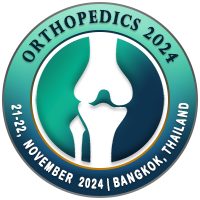
Mohammed Azher
Bedford Hospital NHS Trust, United KingdomTitle: Extra pulmonary involvement with Sarcoidosis which involves multiple organs
Abstract
Sarcoidosis is a systemic granulomatous disorder that can affect multiple organ
systems, including the bones. Sarcoidosis bone lesions, although less common
than pulmonary or lymphatic involvement, can significantly impact patients'
quality of life and functional outcomes. This abstract presents a systematic
literature review aimed at assessing the current evidence regarding the
management of sarcoidosis bone lesions.
A comprehensive search was conducted using electronic databases, including
PubMed and EMBASE, to identify relevant articles published between 2010 and
2023. The search strategy employed a combination of keywords related to
sarcoidosis, bone involvement, and management strategies. Articles that focused
on the diagnosis, treatment, and outcomes of sarcoidosis bone lesions were
included.
The review identified a total of 25 articles meeting the inclusion criteria. The
findings highlighted the heterogeneity of clinical presentations of sarcoidosis bone
lesions, ranging from asymptomatic findings on imaging to localised pain and
fractures. Diagnostic approaches varied, with imaging modalities such as X-ray,
computed tomography (CT), and magnetic resonance imaging (MRI) being
commonly employed.
Pharmacological interventions formed the cornerstone of management, with
systemic corticosteroids being the most frequently utilised treatment option.
However, the optimal dosage, duration, and tapering regimens remain subjects of
debate. Immunosuppressive agents, such as methotrexate and azathioprine, were
considered in refractory cases or to facilitate steroid sparing. Bisphosphonates
were sometimes employed to address bone loss and promote fracture healing.
Surgical interventions, including curettage, bone grafting, and joint replacement,
were indicated in selected cases of refractory pain, impending fractures, or joint
destruction. However, the decision for surgery was individualised, considering
disease activity, patient factors, and functional limitations.
The review highlighted the need for a multidisciplinary approach in the
management of sarcoidosis bone lesions, involving rheumatologists,
pulmonologists, orthopaedic surgeons, and radiologists. Long-term follow-up and
monitoring were emphasised to detect disease progression, evaluate treatment
response, and manage potential complications.
In conclusion, sarcoidosis bone lesions present unique diagnostic and
management challenges. While corticosteroids remain the mainstay of treatment,
the evidence supporting other pharmacological agents and surgical interventions
is limited. This study proposes that should bone lesions be identified, further
investigations including a full blood screen including ACE and chest x ray should
be carried out before submitting the patient to invasive investigations. If
suspected, a simple procedure like bronchoscopy/EBUS can provide diagnosis.
Further research, including large-scale randomised controlled trials, is warranted
to establish standardised management guidelines and improve outcomes in
patients with sarcoidosis bone lesions
Biography
Dr Mohammed Azher graduated from King Edward Medical College, Lahore, Pakistan in 1978 and went on to work in various centres across the UK for his general professional and respiratory medicine training. in 1991 he was appointed as a consultant chest physician in Armed Forces Hospital, Riyadh, Saudi Arabia, where he was involved in postgraduate education and training. Dr Azher joined Bedford Hospital in 2002 and now also runs his weekly private practice from the Manor Hospital in Biddenham.
Dr Azher has a keen interest in postgraduate education and is currently Foundation Programme Director and Royal College tutor for Bedfordshire Hospitals NHS Foundation Trust. He is also lead respiratory physician for lung cancer and COPD.
His research interest involves interstitial lung disease and pulmonary vascular problems.

